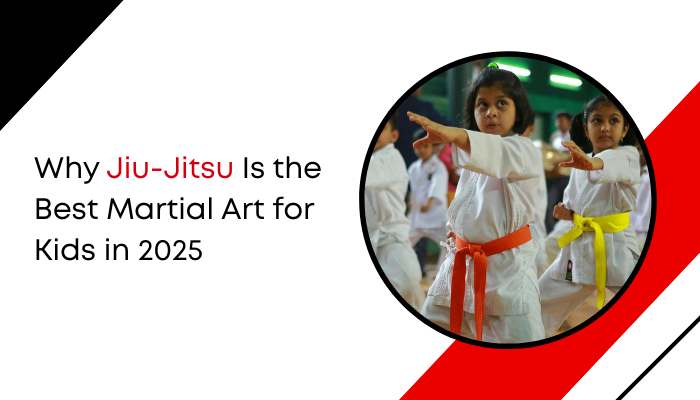Jiu-Jitsu has surged in popularity over recent years—not just among adults, but also with kids. But what makes Jiu-Jitsu stand out in the crowded world of martial arts for children? Is it just about learning to grapple, or is there more beneath the surface? If you’re a parent considering martial arts for your child, or simply curious about why Jiu-Jitsu is gaining such praise, you’ve come to the right place.
In this article, we’ll explore why Jiu-Jitsu is the best martial art for kids in 2025. From physical health and emotional resilience to social and mental development, Jiu Jitsu offers far-reaching benefits that extend well beyond the mats. Additionally, I’ll share real-life examples and insights to illustrate how this dynamic art form can positively impact a young child’s life.
What Makes Jiu-Jitsu Unique and Kid-Friendly?
Jiu-Jitsu is often called “the gentle art,” focused on leverage, technique, and submission rather than striking. This makes it especially suitable for kids, providing effective self-defense skills while promoting respect and control.
Physical Development with Safety in Mind
Kids practicing Jiu-Jitsu develop:
-
Strength and Coordination: The grappling motions improve muscle and motor skills in a safe, low-impact way.
-
Balance and Flexibility: Rolling and positional drills enhance body awareness and agility.
-
Endurance: Sessions often combine technical drills with light conditioning, supporting cardiovascular health.
Unlike sports where hitting or kicking is involved, Jiu-Jitsu emphasizes control tactics that reduce injury risk. In fact, many practitioners find that kids learn how to fall safely, an invaluable skill for all physical activities.
Emotional and Mental Benefits: Confidence, Focus, and Resilience
Jiu-Jitsu isn’t just physical; it’s deeply mental. The discipline teaches children to persevere through challenges—on and off the mat.
-
Confidence Boost: Kids gain confidence by mastering skills and progressing through belt ranks. This success spills over into school and social life.
-
Self-Discipline: The structured environment of training fosters respect for rules, instructors, and peers.
-
Emotional Regulation: Children learn to stay calm under pressure, an important life skill.
-
Problem-Solving: Grappling requires quick thinking, strategy, and adaptability.
For example, a shy child I knew started Jiu Jitsu timid and quiet, but gradually blossomed into a social leader, able to handle frustration better and even speak up confidently in class.
Social Skills and Community: More Than Just a Sport
Training in Jiu-Jitsu means becoming part of a community. Classes foster friendships, teamwork, and mutual respect.
-
Kids learn empathy by partnering with others and understanding different skill levels.
-
They experience sportsmanship by winning humbly and losing gracefully.
-
The physical closeness helps those who might struggle socially find comfort without words.
Many schools encourage family participation, building bonds that extend beyond training floors. This inclusive atmosphere nurtures children’s social and emotional growth.
Practical Tips for Parents Considering Jiu-Jitsu for Their Kids
-
Find certified instructors experienced with children. Age-appropriate teaching is crucial.
-
Start when the child shows interest and basic coordination. Often around 4-6 years old.
-
Observe a trial class to assess fit and comfort level.
-
Communicate with instructors about goals and concerns.
-
Promote consistent attendance to support steady development.
A Story that Resonates: Overcoming Challenges Through Jiu-Jitsu
A young boy battling anxiety found a new sense of calm and confidence after joining Jiu-Jitsu classes. At first, the room seemed intimidating, the physical contact overwhelming. But through patient coaching and supportive peers, he learned to channel nervous energy into focused movement. Today, he’s not only stronger physically but has tools to face everyday stresses with bravery—showcasing how Jiu Jitsu supports kids holistically.
Jiu-Jitsu as a Foundation for Lifelong Fitness and Values
Starting Jiu-Jitsu early builds more than athletic skills. It lays down values and habits for a healthy lifestyle:
-
Respect and humility
-
Dedication and perseverance
-
Healthy coping strategies
-
Positive peer relationships
These gifts empower children to navigate life’s complexities with resilience and integrity.
Final Thoughts: Why Jiu-Jitsu Is the Best Choice for Kids
Jiu-Jitsu stands out in 2025 as the best martial art for kids because it combines physical development, mental resilience, and social learning in a safe and supportive environment. Whether your child dreams of competition or simply wants confidence and fun, Jiu-Jitsu delivers.
For parents looking to nurture well-rounded, empowered children ready to face life’s challenges with strength and grace, Jiu Jitsu isn’t just a sport—it’s a lifelong asset.
If you’re considering enrolling your child, trust that jiu jitsu for kids offers a powerful path to growth, confidence, and joy.
Click – techtrekspot.online
